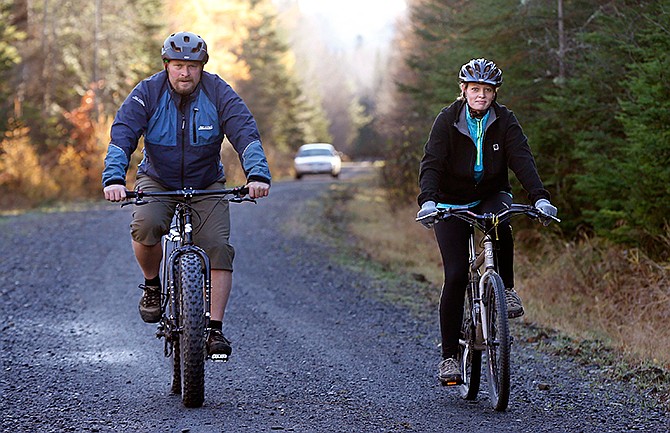FORT KENT, Maine (AP) - Maine health authorities struggled to reach a compromise Thursday with nurse Kaci Hickox that would keep her away from other people, in the nation's most closely watched clash between personal freedom and fear of Ebola.
Hickox, 33, stepped out of her home on the remote northern edge of Maine for the second day in a row and went on a morning bike ride with her boyfriend, practically daring authorities to go to court to have her confined against her will, as they threatened to do for days.
By evening, it was unclear whether the state had gone to court or whether there had been any progress toward ending the standoff. The governor's office and Hickox's lawyers would not comment.
Hickox, who returned to the U.S. last week from treating Ebola victims in West Africa as a volunteer with Doctors Without Borders, has been under what Maine is calling a voluntary quarantine at her home in this town of 4,300 people.
She has defied the restrictions, saying that her rights are being violated and that she is no threat to others because she has no symptoms. She tested negative last weekend for Ebola, though it can take days for the virus to reach detectable levels.
Her 21-day quarantine - the incubation period for the Ebola virus - is scheduled to end on Nov. 10.
Gov. Paul LePage said a scaled-down quarantine that was discussed by Hickox's lawyer and state attorneys would have allowed her to go for walks, runs and bicycle rides while preventing her from going into populated public places or coming within 3 feet of others.
Around midday, however, LePage said that the hours of negotiations had gone nowhere, and that he was prepared to use the full extent of his authority to protect the public.
"I was ready and willing - and remain ready and willing - to reasonably address the needs of health care workers meeting guidelines to assure the public health is protected," he said.
Hickox stepped into the media glare when she returned from Sierra Leone to become subject to a mandatory quarantine in New Jersey. After an uproar, she was released and traveled more than 600 miles to the small town on the Canadian border where she lives with her boyfriend.
She said she is following the federal Centers for Disease Control and Prevention recommendation of daily monitoring for fever and other signs of the disease.
An unmarked state police cruiser followed Hickox on her hour-long bike ride on trails near her home, but police could not take action to detain her without a court order signed by a judge.
"I really hope that we can work things out amicably and continue to negotiate," she said.
Maine law allows a judge to confine someone if health officials demonstrate "a clear and immediate public health threat."
States have broad authority under long-established law to quarantine people to prevent the spread of disease. But legal experts said there are differences here that could work in Hickox's favor in court: People infected with Ebola are not contagious until they have symptoms, and the virus is not spread through casual contact.
Word made its way quickly around the town about Hickox.
Priscilla Staples said that some are fearful of Hickox's presence, but Hickox "has done nothing wrong, and she has every right in the world to go for a bike ride."
Some states like Maine, New York and New Jersey are going above and beyond the CDC guidelines to require automatic quarantines. So is the U.S military.
Related video report:

